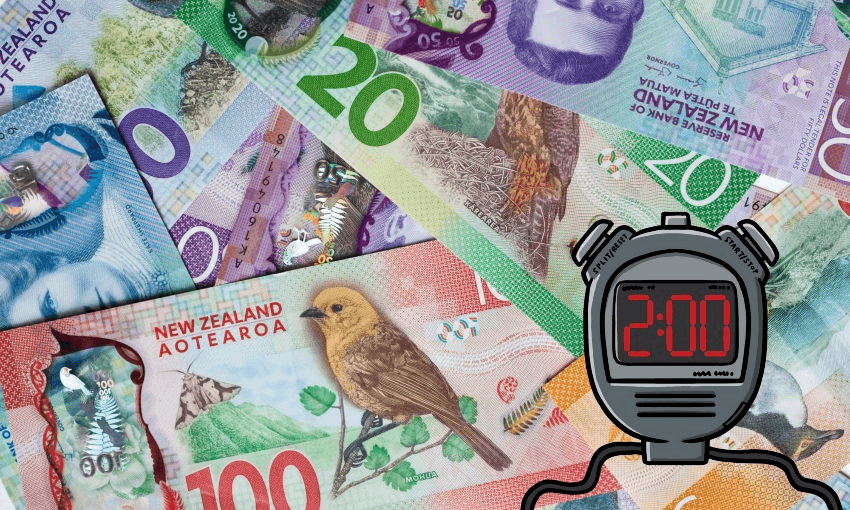Voting is under way in the New Zealand general election. Explore the main parties’ pledges at Policy.nz, but here’s a whistle-stop tour of what’s on offer in the world of the economy, tax and debt.
Read more two-minute policy wraps here
Under the government’s economic response to Covid-19, crown debt is forecasted to reach 55% of GDP by 2025 – a burden younger generations will need to repay. Each party favours a different approach to handle the debt, either by increasing public spending and raising taxes or by cutting taxes to stimulate activity and reducing public spending. So what are the policies?
Debt and taxes
The National Party’s main aim is to reduce crown debt to 30% of GDP within 10 years, mostly by reducing public spending and stimulating private sector investment and activity.
This includes a temporary income tax cut by raising three different tax thresholds, stopping government payments to the Super Fund for four years, ending the government’s environmental job programmes and repealing the Auckland regional fuel tax.
The party would also aim to reduce the burden on businesses by allowing them to instantly write off assets of up to $150,000, raising the compulsory GST threshold from $60,000 to $75,000 and increasing the provisional tax threshold from $2,500 to $25,000.
Alternatively, the Labour Party would continue many of its programmes established after Covid-19 and would finance the spending by implementing a 39% tax on income over $180,000 and taxing multinational tech companies. It would also continue to offer tax relief to SMEs through its tax loss carry-back scheme introduced earlier this year.
The Act Party would pursue an aggressive regime to reduce spending and taxes in order to achieve a surplus by 2024. Its main policies include a tax cut on income over $48,000, incentivising beneficiaries to return to work by reducing benefits, ending the Kiwi Build programme, the winter energy payment and abolishing the Provincial Growth Fund.
The Greens would continue to finance the Covid-19 response by taxing the 6% richest New Zealanders. The tax rates would be set at 1% of net wealth over $1m and 2% of net wealth over $2m. It would also tax multinational tech companies and digital advertising revenue and introduce a 37% tax on net income over $100,000 and a 42% tax on net income over $150,000 to generate $1.29 billion a year.
NZ First’s vision statement in its newly released policy document says the only way to get out of a debt hole is to grow the economy, so wants a reduction in business taxation. “Although initially this will result in greater debt, such an environment will result in far greater wealth and the decline in debt relatively.” The party would institute a manufacturers’ tax rate of 20% and “explore the feasibility” of lowering the tax rate for exporters.
Economic development
Ultimately, a strong economy means any government debt will be far easier to pay back. So what is each party’s plan to encourage economic development?
Labour says the recovery and rebuild should focus on getting people back to work and providing training for those who are out of work. It will therefore continue to subsidise apprenticeships in order to get more workers into critical trades and infrastructure industries, and continue its “Mana in Mahi” employment programme for people at risk of long-term unemployment.
The party also sees value in bringing more international investment into the country, such as Microsoft, which has plans to establish a data centre region in New Zealand. Labour says it will increase funding in order to attract more of this type of foreign investment.
While National also wants to attract more foreign investment and would do so by removing restrictions on foreign ownership of residential property, many of its economic policies focus on SMEs and the domestic tech industry.
The party would encourage businesses to expand and grow the workforce by paying each one $10,000 for each new full-time employee. It says it would also reinstate 90-day trial periods for all businesses, allow people who lose their job to withdraw retirement savings to start new businesses, increase government investment in NZ technology companies and increase funding for business mentoring and startup advisers.
Meanwhile, the Green Party will focus on growing the economy with climate change in mind, by creating a plan to provide training for new clean energy jobs. The party would also support campaigns to promote NZ-made products and fund farmers’ transition to regenerative and sustainable agriculture, thus tapping into a lucrative global organic market.
One of the main ways the Act Party aims to grow the economy is to scrap the Resource Management Act and other regulations that hobble business activity. The party would also repeal the ban on oil gas exploration and the ban on genetic engineering in order to provide farmers access to new technologies and agricultural methods.
NZ First has targeted the aquaculture industry in its plans for economic development, and says it will increase funding of aquaculture interests and invest more in deep sea aquaculture.
As for the minor parties, the New Conservatives would also scrap the ban on oil gas and exploration and gene editing and would aim to become a net exporter of energy.
The Māori Party also sees promise in sustainable policies and will fund Māori farmers to transition to regenerative farming practices and develop a national Māori strategy for renewable energy and clean technology.
Finally, The Opportunities Party aims to free up science funding and relax gene editing regulations and change visa rules to attract highly skilled migrants into New Zealand.
Explore the parties’ pledges in more depth at Policy. The essential campaign dates are here. For all you need to know about the cannabis referendum click here. For the assisted dying referendum click here.





